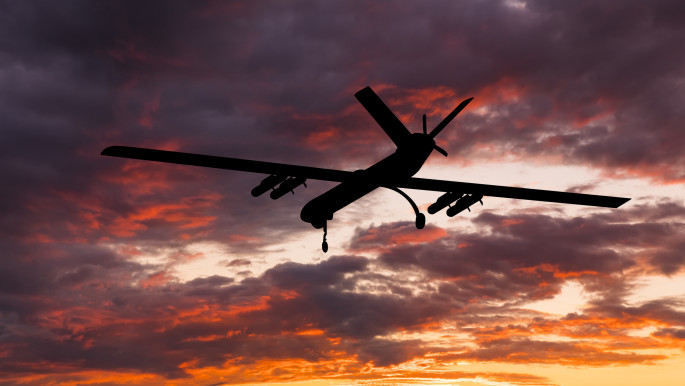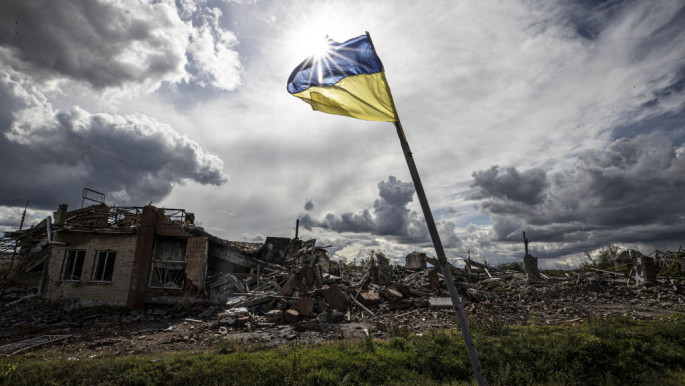
How the Ukraine war reshaped Russia and Iran's military ties

Since launching its invasion of Ukraine one year ago, Russia has begun establishing what the United States calls an "unprecedented" defence partnership with Iran. But how truly unprecedented is this partnership?
On 24 February, the first anniversary of the Ukraine war's outbreak, US National Security Council spokesperson John Kirby claimed that Russia could soon provide Iran with advanced fighter jets as part of their rapidly expanding defence relationship.
"In November, Iran shipped artillery and tank rounds to Russia for use in Ukraine," he said. "And Russia is planning to cooperate with Iran to obtain even more military equipment. In return, Russia has been offering Iran unprecedented defence cooperation, including on missiles, electronics and air defence."
"Russia and Iran are still testing out a new type of security partnership that is being driven by Russia's need for Iranian drones to overwhelm Ukrainian forces"
He warned that "there is this growing cooperation between Iran and Russia, and it's not only certainly going to make things in Ukraine more difficult, but it could certainly make the security situation in the Middle East more difficult".
Iran has supplied Russia with hundreds of single-use, explosive-laden drones, often dubbed kamikaze or ‘suicide’ drones by the media. Since September, Russia has used these drones in repeated attacks against Ukraine's electricity grid. Moscow and Tehran have plans to build a factory in Russia that will locally manufacture at least 6,000 of these drone types.
Russia is also expected to supply Tehran with at least 24 advanced Su-35 fighter jets to help it upgrade its aged air force.
"Russia and Iran are still testing out a new type of security partnership that is being driven by Russia's need for Iranian drones to overwhelm Ukrainian forces," Nicholas Heras, the senior director of strategy and innovation at the New Lines Institute, told The New Arab.
"This new partnership is in a nascent stage and might lead to a formal defence alliance between the two countries."
Heras explained that while Iran will eventually want to acquire more advanced weapons systems from Russia, that type of formal arrangement would "depend on how far Moscow wants to go with this partnership" and "on the Russian defence industry having access to parts for weapons systems which are currently sanctioned".
He added: "It's safe to say that neither Moscow nor Tehran is completely ready to consummate a newer, deeper defence relationship just yet, but both countries are in a wooing stage".
Other analysts are sceptical that what the two sides are building constitutes an "unprecedented" long-term strategic partnership.
|
|
"Despite Iran's ongoing deliveries of drones to Russia in January, I still believe that the current increase in Tehran-Moscow interaction is a short-squeeze," Anton Mardasov, an independent Russian analyst and non-resident scholar of the Middle East Institute's Syria programme, told The New Arab.
He noted that, on the one hand, Russian-Iranian military cooperation was sometimes deeper than commonly believed. For example, during the days of the UN arms embargo against Iran, Moscow helped Tehran improve its radar identification system by supplying advanced, non-export radars and the two sides concluded agreements on space reconnaissance.
He also suspects there were "other episodes of intelligence and military cooperation" behind the scenes.
"On the other hand, Moscow and Tehran have enough contradictions in foreign policy that not only the authorities but also the populations of both countries are well aware of, as various opinion polls show," he said.
"This new partnership is in a nascent stage and might lead to a formal defence alliance between the two countries"
The one thing Russia did not want was to end up becoming "dependent on Tehran" for certain arms.
"I think the Kremlin kept this point in mind, and on the wave of the raised clamour, the sides still found a rather business-like cooperation scheme, which is supposed to level out Moscow's vulnerable position," Mardasov said.
This cooperation includes exchanging intelligence and technical information on Western-made weaponry and concluding the implementation of a contract to supply Iran Su-35s.
"Other actions on joint production of passenger helicopters and other things are also possible, which effectively silences Russia's urgent need for means of destruction and turns cooperation into a business relationship," Mardasov said.
"This is actually a subtle point, but it is what bilateral relations are built on, given the balance of power. I would not exaggerate the parties' readiness for a relationship that could be called an alliance."
He pointed out that military relations between Russia and China have markedly strengthened in recent years, with the two sides conducting joint air patrols, among other things. However, no one has called this an alliance. Rather, it is "simply interaction against a backdrop of common challenges and opponents, which could be quickly curtailed if other prospects emerge".
He also noted that Iranian drone deliveries were "certainly an extremely important factor" that impacted the situation in Ukraine in 2022.
"Moscow did not initially plan to conduct large-scale combat operations and did not even understand how much high-precision assets would have to be expended," he said. "Therefore, the use of Iranian drones made it possible to replace the use of many cruise missiles, which previously in peacetime would have taken several years to produce."
|
|
Kyle Orton, an independent Middle East analyst, argues that this partnership is not as new as it otherwise may appear.
"The Iranian-Russian collaboration in the war on Ukraine is being presented as a novel development, and there are technical aspects to this that are new - like the Iranian drone factory being set up on Russian territory - but the relationship is not itself an innovation," he told The New Arab.
"Iran and Russia (and China) have been a unitary strategic bloc - an Axis, one might say - for many decades, bound by an ideological hostility to the West and broad-spectrum cooperation," he said.
In Orton's view, wherever one finds Iran, Russia is right there with it - a reality he argues many Middle Eastern governments, especially Israel, have proven slow to recognise.
"Some analysts are sceptical that what the two sides are building constitutes an 'unprecedented' long-term strategic partnership"
He recounted that many Arab countries bet on better relations with Russia after Moscow's overt military intervention in the Syrian conflict in 2015. Since Russia began actively engaging in the region militarily as the US drew down, these regional countries believed hedging was their best bet.
"Some of them might well have believed similar things to Israel, that Russia would (or could) restrain Iran," he said. "And it opened up weapons sales that do not come with conditions about human rights."
He added: "For many of the Arab states, though, the shifting policy on Russia was an implicit acknowledgement that Iran and Russia are a package: they went to Moscow after they came to terms with Iran".
On top of that, regional countries like Egypt and Jordan were not all that invested in the anti-Iran posture to begin with. The United Arab Emirates (UAE) was also friendly with Iran "in practice" and served as a centre for circumventing sanctions against Iran.
Even Saudi Arabia moved towards detente with Iran after the US refused to respond militarily to a deadly September 2019 drone and missile attack against its oil infrastructure.
Many of these Arab governments now realise this was not a good bet.
"They can see that the Russian weapons systems are substandard, and they have, in effect, purchased a lot of expensive junk," Orton said. "And they must now understand that Russian security guarantees for their regimes are worthless."
On the other hand, there is not much they can do at this stage to change course since it would be both "politically embarrassing and practically difficult", according to the analyst.
"Restructuring supply chains takes time, and any attempt would open them up to retaliation from Iran's subversive and terrorist activities - avoidance of which was the very reason for the policy switch in the first place," Orton said.
He reiterated that the strategic shift of regional US allies towards a non-confrontational approach with the Iran-Russia axis precedes the war on Ukraine.
"The Ukraine war has in some ways brought this to the fore," he said.
Paul Iddon is a freelance journalist based in Erbil, Iraqi Kurdistan, who writes about Middle East affairs.
Follow him on Twitter: @pauliddon




